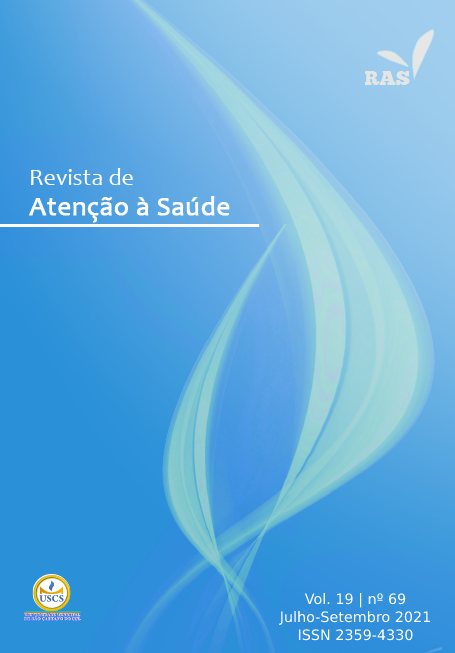Effects of Bariatric Surgery on the Consumption of Sweets and Fatty Foods by Patients in their Pre and Postoperative Period
DOI:
https://doi.org/10.13037/ras.vol19n69.7745Keywords:
nutritional assessment, obesity management, feeding behaviourAbstract
INTRODUCTION: Patients undergoing bariatric surgery (CB) report changes in their eating behaviors that may result from behavioral, anatomical and neuro endocrine causes resulting from the impacts of the surgery. However, there is no consensus in the scientific literature on the impacts of CB on eating behaviors associated, specifically, with the consumption of very caloric foods. OBJECTIVES: To analyze the scientific production that discusses the association between consumption of food with high energy density by patients and their respective periods of pre or post-operative of the BC. MATERIAL AND METHODS: Integrative literature review carried out in the SciELO, Medline, and Lilacs databases. Data collection took place between March and June 2020. For the analysis of this study, articles published after 2015 with research proposals in line with the objective of this research were considered. RESULTS: The initial sample of articles with the application of the inclusion and exclusion criteria were 114 articles. After selection looking for manuscripts that met the scope of this review, the total number of papers selected to study its content was 34 articles. CONCLUSIONS: The articles indicate that the change in the consumption of sweets and fatty foods in the preoperative period results from behavioral changes aimed at weight loss. However, after CB, the reduction in consumption of these high energy density foods may be associated with intestinal neuroendocrine changes related to satiety, as well as a reduction in the palatability of these food groups.
Downloads
References
World Health Organization. Obesity: Preventing and managing the global epidemic. Report of a WHO Consultation on Obesity. Geneva: WHO; 1998.
GUYTON AC, HALL JE. Tratado de Fisiologia Médica. 11ª ed. Rio de Janeiro, Elsevier Ed., 2006.
Mechanick JI, Youdim A, Jones DB, Timothy GW, Hurley DL, Molly MM, et al. Clinical Practice Guidelines for the Perioperative Nutritional, Metabolic, and Nonsurgical Support of the Bariatric Surgery Patient—2013 Update: Cosponsored by American Association of Clinical Endocrinologists, The Obesity Society, and American Society for Metabolic & Bariatric Surgery. Surgery for Obesity and Related Diseases. Weight Recidivism Post-Bariatric Surgery: A Systematic Review. Obesity Surgery, v. 23, n. 11, 2013. Disponível em: https://link.springer.com/article/10.1007%2Fs11695-013-1070-4. Acesso em: 20 Mar. 2020.
Fink-Miller E, Rigby A. The Utility of the Weight and Lifestyle Inventory (WALI) in Predicting 2-Year Weight Loss After Bariatric Surgery. Obesity Surgery, v. 27, n. 4, p. 933–939, 2016. Disponível em: <https://link.springer.com/article/10.1007/s11695-016-2385-8#citeas>. Acesso em: 20 Mar. 2020.
SOARES JM, MICHELETTI J, OLIVEIRA ML, SILVA ACG, CAVAGNARI MAV Food practices of patients in postoperative surgery of bariatric surgery: integration review. BRASPEN J, v. 32, n, 3, 2017. Disponível em: https://pesquisa.bvsalud.org/portal/resource/pt/biblio-906072. Acesso em: 20 Mar. 2020.
SOARES FL, BISSONI DE SOUSA L, CORRADI-PERINI C, RAMOS DA CRUZ MR, NUNES MGJ, et al. Food Quality in the Late Postoperative Period of Bariatric Surgery: An Evaluation Using the Bariatric Food Pyramid. Obesity Surgery, v. 24, n. 9, 2014. Disponível em: https://link.springer.com/article/10.1007/s11695-014-1198-x. Acesso em: 20 Mar. 2020.
ZARSHENAS N, TAPSELL LC, NEALE EP, BATTERHAM M, TALBOT ML. The Relationship Between Bariatric Surgery and Diet Quality: a Systematic Review. Obesity Surgery. 2020. Disponível em: https://pubmed.ncbi.nlm.nih.gov/31940138/. Acesso em: 20 Mar. 2020.
Coluzzi I, Raparelli L, Guarnacci L, Paone E, Del Genio G, le Roux CW, et al. Food Intake and Changes in Eating Behavior After Laparoscopic Sleeve Gastrectomy. Obesity Surgery, v. 26, n. 9, 2016. Disponível em: https://link.springer.com/article/10.1007%2Fs11695-015-2043-6. Acesso em: 20 Mar. 2020.
FREIRE RH, BORGES MC, ALVAREZ-LEITE JI, CORREIA MITD. Food quality, physical activity, and nutritional follow-up as determinant of weight regain after Roux-en-Y gastric bypass. Nutrition, v. 28, n. 1, 2012. Disponível em: <https://www.sciencedirect.com/science/article/abs/pii/S0899900711000487?via%3Dihub>. Acesso em: 20 Mar. 2020.
Le Roux CW, Bueter M, Theis N, Werling M, Ashrafian H, Löwenstein C, et al. Gastric bypass reduces fat intake and preference. American Journal of Physiology-Regulatory, Integrative and Comparative Physiology. v. 301, n. 4, 2011. Disponível em:https://journals.physiology.org/doi/full/10.1152/ajpregu.00139.2011. Acesso em: 20 Mar. 2020.
MATHES CM, SPECTOR AC. Food selection and taste changes in humans after Roux-en-Y gastric bypass surgery: a direct-measures approach. Physiology & behavior, v. 107, n. 4, p. 476-483, 2012. Disponível em: https://www.sciencedirect.com/science/article/abs/pii/S0031938412000807?via%3Dihub. Acesso em: 20 Mar. 2020.
Sugerman HJ, Kellum JM, Engle KM, Wolfe L, Starkey JV, Birkenhauer R, et al. Gastric bypass for treating severe obesity. Am J Clin Nutr, v. 55, n. 2, 1992. Disponível em: https://www.ncbi.nlm.nih.gov/pubmed/1733127. Acesso em: 20 Mar. 2020.
Kapoor N, Al-Najim W, le Roux CW, Docherty NG. Shifts in Food Preferences After Bariatric Surgery: Observational Reports and Proposed Mechanisms. Curr Obes Rep., v. 6, n. 3, p. 246-252, 2017. Disponível em: <https://pubmed.ncbi.nlm.nih.gov/28699145/>. Acesso em: 20 Mar. 2020.
Adler S, Fowler N, Robinson AH, Salcido L, Darcy A, Toyama H, et al. Correlates of Dietary Adherence and Maladaptive Eating Patterns Following Roux-en-Y Bariatric Surgery. Obesity Surgery, v. 28, n. 4, 2017. Disponível em: https://link.springer.com/article/10.1007%2Fs11695-017-2987-9. Acesso em: 20 Mar. 2020.
NERY MA, CÂMERA VJ, SILVEIRA MS. REGANHO DE PESO PÓS CIRURGIA BARIÁTRICA. UMA REVISÃO DE LITERATURA. Revista Ciência (In) Cena, v. 1, n. 11, p. 40-52, 2020.
Cooper HM. The Integrative research review. Beverly Hills: SAGE Publications; 1984.
SCOTT‐FINDLAY S, ESTABROOKS CA. Mapping the organizational culture research in nursing: a literature review. Journal of advanced nursing, v. 56, n. 5, p. 498-513, 2006.
Broome ME. Integrative literature reviews for the development of concepts. In: Rodgers BL, Knafl KA. Concept development in nursing: foundations, techniques, and applications. 2nd ed. Philadelphia: Saunders; c2000.
Brasil. Conselho Nacional de Saúde. Resolução nº 510, de 7 de abril de 2016. Diário Oficial da União, Poder Executivo, Brasília, DF, 24 maio 2016. Seção 1, n. 98, p. 44-6
LEÃO LL, ABRANTES ALO, GONÇALVES RV, SOUZA SA, SOARES LJF, FARIAS PKS. Avaliação do estado nutricional de pacientes pós-operados submetidos à cirurgia bariátrica. RBONE - Revista Brasileira de Obesidade, Nutrição e Emagrecimento, v. 12, n. 72, p. 439-445, 15 ago. 2018.
Paixão AL, Costa VVL, Dias JS, Nogueira AC. Perfil alimentar de pacientes pós cirurgia bariátrica. RBONE-Revista Brasileira De Obesidade, Nutrição E Emagrecimento, 12(71), 391-399, 2018.
CAMBI MPC, MARCHESINI SD, BARETTA GAP. Reganho de peso após cirurgia bariátrica: avaliação do perfil nutricional dos pacientes candidatos ao procedimento de plasma endoscópico de argônio. ABCD. Arquivos Brasileiros de Cirurgia Digestiva (São Paulo), v. 28, n. 1, p. 40-43, 2015.
Nikiforova I, Barnea R, Azulai S, Susmallian S. Analysis of the Association between Eating Behaviors and Weight Loss after Laparoscopic Sleeve Gastrectomy. Obesity facts, v. 12, n. 6, p. 618-631, 2019.
Ruiz-Tovar J, Boix E, Bonete JM, Martínez R, Zubiaga L, Díez M, et al. Effect of preoperative eating patterns and preoperative weight loss on the short-and mid-term weight loss results of sleeve gastrectomy. Cirugía Española (English Edition), v. 93, n. 4, p. 241-247, 2015.
Barrea L, Di Somma C, Macchia PE, Falco A, Savanelli MC, Orio F, et al. Influence of nutrition on somatotropic axis: Milk consumption in adult individuals with moderate-severe obesity. Clinical Nutrition, v. 36, n. 1, p. 293–301, 2015. Disponível em: https://www.sciencedirect.com/science/article/pii/S0261561415003453. Acesso em: 20 Mar. 2020.
RAUTIAINEN S, WANG L, LEE IM, MANSON JE, BURING JE, SESSO HD. Dairy consumption in association with weight change and risk of becoming overweight or obese in middle-aged and older women: a prospective cohort study. The American Journal of Clinical Nutrition, v. 103, n. 4, p. 979–988, 2016. Disponível em: https://academic.oup.com/ajcn/article/103/4/979/4662886. Acesso em: 20 Mar. 2020.
HANSEN TT, JAKOBSEN TA, NIELSEN MS, SJÖDIN A, LE ROUX CW, SCHMIDT JB. Hedonic changes in food choices following Roux-en-Y gastric bypass. Obesity surgery, v. 26, n. 8, 2016. Disponível em: https://link.springer.com/article/10.1007/s11695-016-2217-x. Acesso em: 20 Mar. 2020.
JUSTINO YAC, Tatagiba TNB, Pogian LP, Pimentel FC. Modificações comportamentais entre o pré e o pós-operatório de pacientes bariátricos. Psicol. rev. (Belo Horizonte), Belo Horizonte , v. 24, n. 2, p. 577-599, ago. 2018 . Disponível em <http://pepsic.bvsalud.org/scielo.php?script=sci_arttext&pid=S1677-11682018000200012&lng=pt&nrm=iso>. Acesso em: 20 Mar. 2020.
Nielsen MS, Andersen IN, Belinda L, Ritz C, le Roux CW, Schmidt JB, et al. Bariatric Surgery Leads to Short-Term Effects on Sweet Taste Sensitivity and Hedonic Evaluation of Fatty Food Stimuli. Obesity (Silver Spring) ; v. 27, n. 11, p. 1796-1804, 2019. Disponível em: <https://pesquisa.bvsalud.org/portal/resource/pt/mdl-31556242>. Acesso em: 20 Mar. 2020.
Kittrell H, Graber W, Mariani E, Czaja K, Hajnal A, Di Lorenzo PM. Taste and odor preferences following Roux-en-Y surgery in humans. PLoS One. v. 13, n. 7, 2018. Disponível em: <https://pubmed.ncbi.nlm.nih.gov/29975712/>. Acesso em: 20 Mar. 2020.
YANOS BR, SAULES KK, SCHUH LM, SOGG S. Predictors of lowest weight and long-term weight regain among Roux-en-Y gastric bypass patients. Obesity surgery, v. 25, n. 8, p. 1364-1370, 2015. Disponível em: https://link.springer.com/article/10.1007%2Fs11695-014-1536-z. Acesso em: 20 Mar. 2020.
Hubert PA, Papasavas P, Stone A, Swede H, Huedo-Medina TB, Tishler D, et al. Associations between Weight Loss, Food Likes, Dietary Behaviors, and Chemosensory Function in Bariatric Surgery: A Case-Control Analysis in Women. Nutrients, v. 11, n. 4, 2019. Disponível em: <https://pubmed.ncbi.nlm.nih.gov/30970617/>. Acesso em: 20 Mar. 2020.
Shoar S, Naderan M, Shoar N, Modukuru VR, Mahmoodzadeh H. Alteration Pattern of Taste Perception After Bariatric Surgery: a Systematic Review of Four Taste Domains. Obes Surg. v. 29, n. 5,, p. 1542-1550, 2019. Disponível em: <https://pubmed.ncbi.nlm.nih.gov/30712168/>. Acesso em: 20 Mar. 2020.
Ahmed K, Penney N, Darzi A, Purkayastha, S. Taste Changes after Bariatric Surgery: a Systematic Review. Obes Surg. v. 28, n. 10, p. 3321-3332, 2018. Disponível em: <https://pubmed.ncbi.nlm.nih.gov/30062466/>. Acesso em: 20 Mar. 2020.
Behary P, Miras AD. Food preferences and underlying mechanisms after bariatric surgery. Proc Nutr Soc, v. 74, n. 4, p. 419-425, 2015. Disponível em: <https://pubmed.ncbi.nlm.nih.gov/25990312/>. Acesso em: 20 Mar. 2020.
Tsouristakis AI, Febres G, McMahon DJ, Tchang B, Conwell IM, Tsang AJ, et al. Long-Term Modulation of Appetitive Hormones and Sweet Cravings After Adjustable Gastric Banding and Roux-en-Y Gastric Bypass. Obes Surg. v. 29, n. 11, p. 3698-3705, 2019. Disponível em: <https://pubmed.ncbi.nlm.nih.gov/31376135/>. Acesso em: 20 Mar. 2020.
Kapoor N, Al-Najim W, le Roux CW, Docherty NG. Shifts in Food Preferences After Bariatric Surgery: Observational Reports and Proposed Mechanisms. Curr Obes Rep., v. 6, n. 3, p. 246-252, 2017. Disponível em: <https://pubmed.ncbi.nlm.nih.gov/28699145/>. Acesso em: 20 Mar. 2020.
Zoon HFA, de Bruijn SEM, Smeets PAM, de Graaf C, Janssen IMC, Schijns W, et al. Altered neural responsivity to food cues in relation to food preferences, but not appetite-related hormone concentrations after RYGB-surgery. Behavioural Brain Research, v. 353, p. 194-202, 2018. Disponível em: <https://www.sciencedirect.com/science/article/pii/S0166432818306016>. Acesso em: 20 Mar. 2020.
Han W, Tellez LA, Niu J, Medina S, Ferreira TL, Zhang X, et al. Striatal Dopamine Links Gastrointestinal Rerouting to Altered Sweet Appetite. Cell metabolism, v. 23, n. 1, p. 103–112, 2016. Disponível em: <https://pubmed.ncbi.nlm.nih.gov/26698915/>. Acesso em: 20 Mar. 2020.
Nance K, Acevedo MB, Pepino MY. Changes in taste function and ingestive behavior following bariatric surgery. Appetite, v. 146, 2020. Disponível em: <https://pubmed.ncbi.nlm.nih.gov/31473274/>. Acesso em: 20 Mar. 2020.
Van Vuuren MAJ, Strodl E, White KM, Lockie PD. Taste, Enjoyment, and Desire of Flavors Change After Sleeve Gastrectomy-Short Term Results. Obesity surgery, v. 27, n. 6, p. 1466–1473, 2017. Disponível em: <https://pubmed.ncbi.nlm.nih.gov/27981459/>. Acesso em: 20 Mar. 2020.
El Labban S, Safadi B, Olabi A. The Effect of Roux-en-Y Gastric Bypass and Sleeve Gastrectomy Surgery on Dietary Intake, Food Preferences, and Gastrointestinal Symptoms in Post-Surgical Morbidly Obese Lebanese Subjects: A Cross-Sectional Pilot Study. Obesity surgery, v. 25, n.12, p. 2393–2399, 2015. Disponível em: <https://pubmed.ncbi.nlm.nih.gov/25982803/>. Acesso em: 20 Mar. 2020.
ZARSHENAS N, TAPSELL LC, NEALE E, BATTERHAM M, TALBOT ML. The Relationship Between Bariatric Surgery and Diet Quality: a Systematic Review. Obesity Surgery. 2020. Disponível em: https://pubmed.ncbi.nlm.nih.gov/31940138/. Acesso em: 20 Mar. 2020.
Smith KR, Papantoni A, Veldhuizen MG, Kamath V, Harris C, Moran TH, et al.. Taste-related reward is associated with weight loss following bariatric surgery. The Journal of Clinical Investigation. v. 1, 2020. Disponível em: <https://www.jci.org/articles/view/137772>. Acesso em: 20 Mar. 2020.
Nance K, Acevedo MB, Pepino MY. Changes in taste function and ingestive behavior following bariatric surgery. Appetite, v. 146, 2020. Disponível em: <https://pubmed.ncbi.nlm.nih.gov/31473274/>. Acesso em: 20 Mar. 2020.
Goldstone AP, Miras AD, Scholtz S, Jackson S, Neff KJ, Pénicaud L, et al. Link Between Increased Satiety Gut Hormones and Reduced Food Reward After Gastric Bypass Surgery for Obesity. The Journal of Clinical Endocrinology & Metabolism, v. 101, n. 2, p. 599–609, 2016 Disponível em: <https://academic.oup.com/jcem/article/101/2/599/2810906>. Acesso em: 20 Mar. 2020.
Nielsen MS, Andersen INSK, Lange B, Ritz C, le Roux CW, Schmidt JB, et al. Roux-En-Y Gastric Bypass and Sleeve Gastrectomy Does Not Affect Food Preferences When Assessed by an Ad libitum Buffet Meal. Obesity surgery, v. 27, n. 10, p. 2599–2605, 2017. Disponível em: <https://pesquisa.bvsalud.org/portal/resource/pt/mdl-31556242>. Acesso em: 20 Mar. 2020.
Sudan R, Sudan R, Lyden E, Thompson JS. Food cravings and food consumption after Roux-en-Y gastric bypass versus cholecystectomy. Surgery for obesity and related diseases : official journal of the American Society for Bariatric Surgery, v. 13, n. 2, p. 220–226, 2017. Disponível em: <https://pubmed.ncbi.nlm.nih.gov/27771313/>. Acesso em: 20 Mar. 2020.
El Labban S, Safadi B, Olabi A. Effect of Roux-en-Y gastric bypass and sleeve gastrectomy on taste acuity and sweetness acceptability in postsurgical subjects. Nutrition. v. 32, p.1299-1302, 2016. Disponível em: <https://pubmed.ncbi.nlm.nih.gov/27264159/>. Acesso em: 20 Mar. 2020.
Downloads
Published
Issue
Section
License
Copyright (c) 2021 Lineker Fernandes Dias, Ana Clara Toledo Detoni, Giovanna Lyssa de Castro Andrade, Gustavo Vilela Alves, João Victor Silveira Machado de Campos, Jordana Martins Machado Araújo

This work is licensed under a Creative Commons Attribution-NonCommercial-ShareAlike 4.0 International License.
Policy Proposal for Journals offering Free Delayed Access
Authors who publish in this magazine agree to the following terms:
- Authors maintain the copyright and grant the journal the right to the first publication, with the work simultaneously licensed under a Creative Commons Attribution License after publication, allowing the sharing of the work with recognition of the authorship of the work and initial publication in this journal.
- Authors are authorized to assume additional contracts separately, for non-exclusive distribution of the version of the work published in this magazine (eg, publishing in institutional repository or as a book chapter), with the acknowledgment of the authorship and initial publication in this journal.
- Authors are allowed and encouraged to publish and distribute their work online (eg in institutional repositories or on their personal page) at any point before or during the editorial process, as this can generate productive changes, as well as increase impact and citation of the published work (See The Effect of Open Access).









